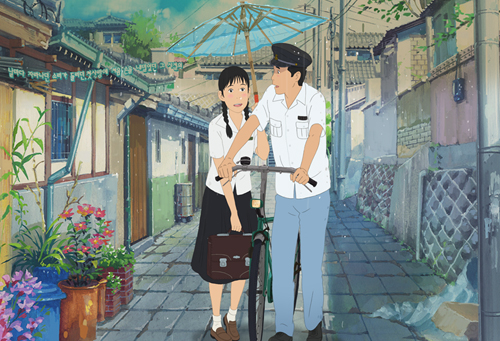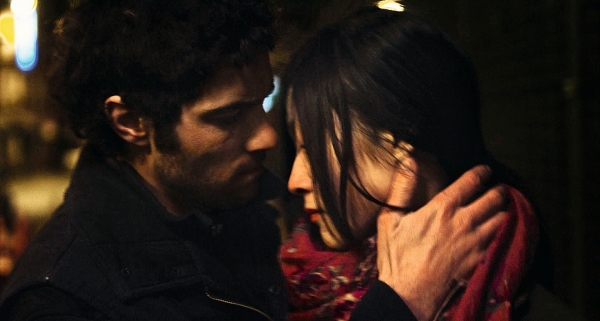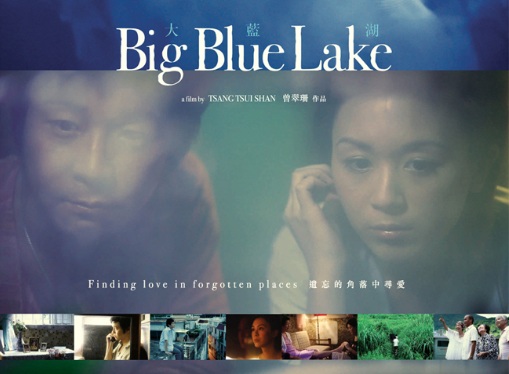November 6th, 2011
The Golden Rock at the 2011 Hong Kong Asian Film Festival - Day 14+15+16
This will be the last of the intense daily postings as the festival is beginning to come to a close. I will cover the films I have left (At least two Nikkatsu movies, and when I finish RED EAGLE on DVD and LET’S GO theatrically), but they will not come as often. Hopefully, I will go back to covering news, because well, someone should do it right.
Green Days (2011, Korea, Dir: Ahn Jae-hoon, Han Hye-jin)

One thing that Japanese animation has always done superior American animation is how accurate they portray reality in animated form. After LIFE IS COOL (the rotoscope animated film) and GREEN DAYS, we can group South Korea into that list. While watching this simple coming-of-age animated drama, Studio Ghibli’s WHISPER OF THE HEART and ONLY YESTERDAY immediately came to mind, and that’s a good thing. The story of a teenage girl growing up in a small town during the 1970s, GREEN DAYS has the unassuming charm of those two Ghibli films, and it even finds a good chance to make use of the animation platform.
While it’s a love story on the surface, GREEN DAYS has a deeper message about the importance of having a dream as opposed to just striving to become a winner in life. While this message may appeal to a teen-and-older audience, everything else is family-friendly. Even though those who grew in the 70s will connect with the period in the film better (Ryan O’Neal and LOVE STORY has a surprisingly important presence here), it should connect better with teenagers. After all, that’s whom the film is speaking to.
Love and Bruises (2011, France/China, Dir: Lou Ye)

As I had tweeted, LOVE AND BRUISES is about the best worst relationship you’ve ever had. The love between Chinese exchange student Hua and blue-collar worker Mathieu is almost entirely physical (they never seem to share more than a few words with each other, at least on screen) , and Mathieu’s hot temper lead to one abuse after another on Hua. And yet, she can’t seem to get herself to leave, as she jumps from one doomed relationship to another.
Anyone experienced in love has had this type of relationship before, even if it isn’t as intense as the one depicted in Lou Ye’s film. This intense romance drama is raw and at times unpleasant, but it also features great performances by Tahar Rahim and Corinne Yam (whom I can tell doesn’t speak fluent Chinese, by the way), top-notch editing, and shaky, but natural cinematography by Yu Lik-Wai. While the story is nothing new (meet, sex, sex, conflict, sex, separation, sex!), it’s a stronger film than I had expected it to be, and that’s a really good compliment when it comes to this year’s festival.
Big Blue Lake (2011, Hong Kong, Dir: Jessey Tsang)

Full disclosure: I met writer-director Jessey Tsang in 2009 to write a magazine story on her, and I went to the village the film is shot in for the story. However, I was not involved in this film in any way, shape, or form, except for hearing about the title during my interviews.
That said, I always look forward ot Jessey’s work, because her gentle, observational style is a quiet voice the Hong Kong indie world needs. While her fellow indie filmmaker confuse the hell out of the people with their self-indulgent, experimental works, Jessey’s feature films are subtle without alienating her audience.
Her latest film, BIG BLUE LAKE, is once again a work partly based on her own life - shot in her own village and even her own home, as well as featuring non-professional village residents as actors. While the observations on her own home are not as sharp as her Beijing-set feature film debut LOVERS ON THE ROAD, it’s a very intimate indie film with issues audiences can actually relate to. On the other hand, Tsang’s direction does get a little awkward at times, as her handling of the dramatic material sometimes feel at odds with the brief detour into documentary territory. This isn’t helped by Leila Kong overdoing her dramatic scenes at times, but Lawrence Chou is excellent as the old classmate that comes into the heroine’s life.
BIG BLUE LAKE is far from a successful film, but as far as Hong Kong indies go, it’s not a bad piece of work. At least I understand it. Most of it, anyway.
Next time: Who knows?

